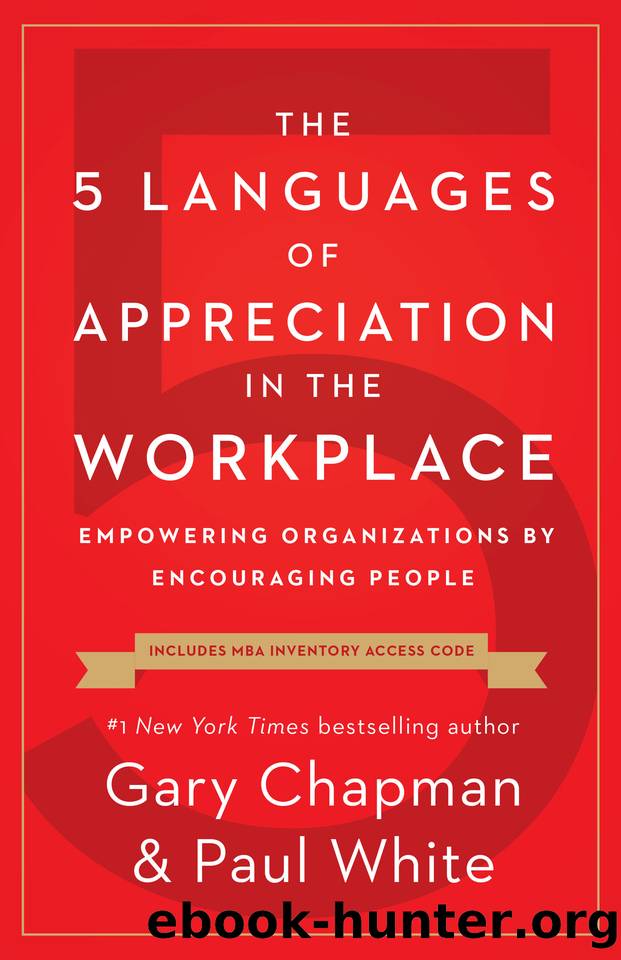The 5 Languages of Appreciation in the Workplace by Paul White & Gary Chapman

Author:Paul White & Gary Chapman [White, Paul]
Language: eng
Format: mobi
Publisher: Moody Publishers
Published: 2018-12-31T16:00:00+00:00
OVERCOMING THE CHALLENGE OF YOUR BLIND SPOT
The first step in getting past your blind spot as a manager or colleague is to become aware of it. Assuming you have taken the Motivating By Appreciation (MBA) Inventory and identified your least favorite language of appreciation, you now have that information. However, it is likely that you really donât understand this language of appreciation.
For me (Paul), Tangible Gifts is my least valued language of appreciation. Certainly, I appreciate receiving a gift card to go out to eat, but it is really not a big deal to me. I can take it or leave it. So it is harder for me to put myself in one of my colleaguesâ shoes and really understand how they could highly value tangible rewards. I often find myself thinking thoughts like, âThey certainly get excited about something that is no big deal,â or âI just donât get it. I would much rather get some praise than some money to eat out.â
Therefore, I have taken the initiative to talk to some of my colleagues whose primary language of appreciation is receiving tangible gifts. I asked one of my team members, âWhat about getting tickets to the ballgame is important to you? Why does that mean so much to you?â His response helped me to see the situation from his point of view.
âBecause,â Joe replied, âfirst, it shows me that my team leader has taken time and interest to find out something about me personally and what I like. I played baseball in college and still love going to games. Second, he took the initiative and effort to go and get the tickets for me. It shows me that doing what it takes to encourage or reward me is worth it to him.â
Once you have identified your least valued language of appreciation, we would encourage you to talk with colleagues for whom this is their primary language of appreciation. Ask them how those actions communicate appreciation to them and how they are encouraged by them. Try to gain a deeper sense of understanding of how others are impacted by your least valued appreciation language. Learning to speak that language effectively with your teammates will then become easier for you.
Leadership studies have shown that successful managers seek to understand the other personâs point of viewâsupervisors, customers, colleagues, and those they manage. 3 If a leader is unable to see another personâs perspective, she will be more likely to make wrong assumptions that lead to poor decisions based on inaccurate information.
Thus, if an employeeâs MBA Inventory results indicate that Quality Time is important to them, the wise manager and colleague will take this information seriously. You may not fully understand why spending individual time with them is that important, but you choose to do so because you take seriously what they say. If you wait until you totally get why it is important to them, you may lose a lot of time and opportunities to communicate appreciationâ and you may lose a team member in the process.
Download
This site does not store any files on its server. We only index and link to content provided by other sites. Please contact the content providers to delete copyright contents if any and email us, we'll remove relevant links or contents immediately.
Bullshit Jobs by David Graeber(3179)
Radical Candor by Kim Scott(2215)
I Am Right, You Are Wrong by Edward De Bono(2107)
23:27 by H. L. Roberts(1891)
Nomadland by Jessica Bruder(1684)
Average Is Over by Tyler Cowen(1541)
High-Impact Interview Questions by Victoria A. Hoevemeyer(1403)
Out of Our Minds: Learning to Be Creative by Ken Robinson(1379)
The Conflict Resolution Phrase Book by Barbara Mitchell & Cornelia Gamlem(1341)
The Ideal Team Player by Patrick M. Lencioni(1316)
The Asshole Survival Guide by Robert I. Sutton(1281)
An Everyone Culture: Becoming a Deliberately Developmental Organization by Robert Kegan & Lisa Laskow Lahey(1281)
Automatic Society by Bernard Stiegler(1219)
Unleashed by Anne Morriss & Frances Frei(1219)
Who by Street Randy & Smart Geoff(1198)
42 Rules of Employee Engagement by Susan Stamm(1191)
Who Moved My Cheese?: An Amazing Way to Deal With Change in Your Work and in Your Life by Johnson Spencer(1177)
96 Great Interview Questions to Ask Before You Hire by Paul Falcone(1131)
The Power of Disability by Al Etmanski(1082)
